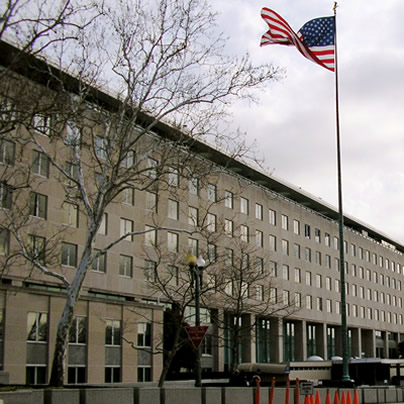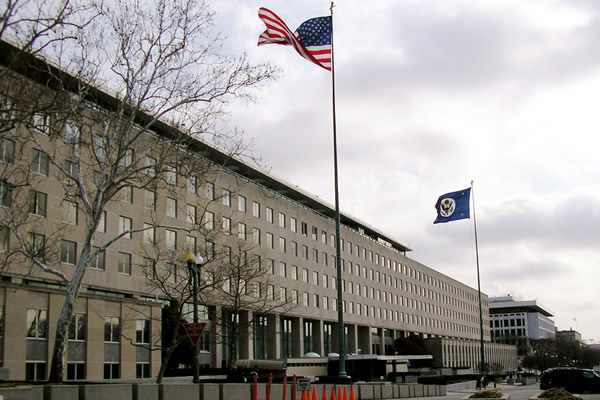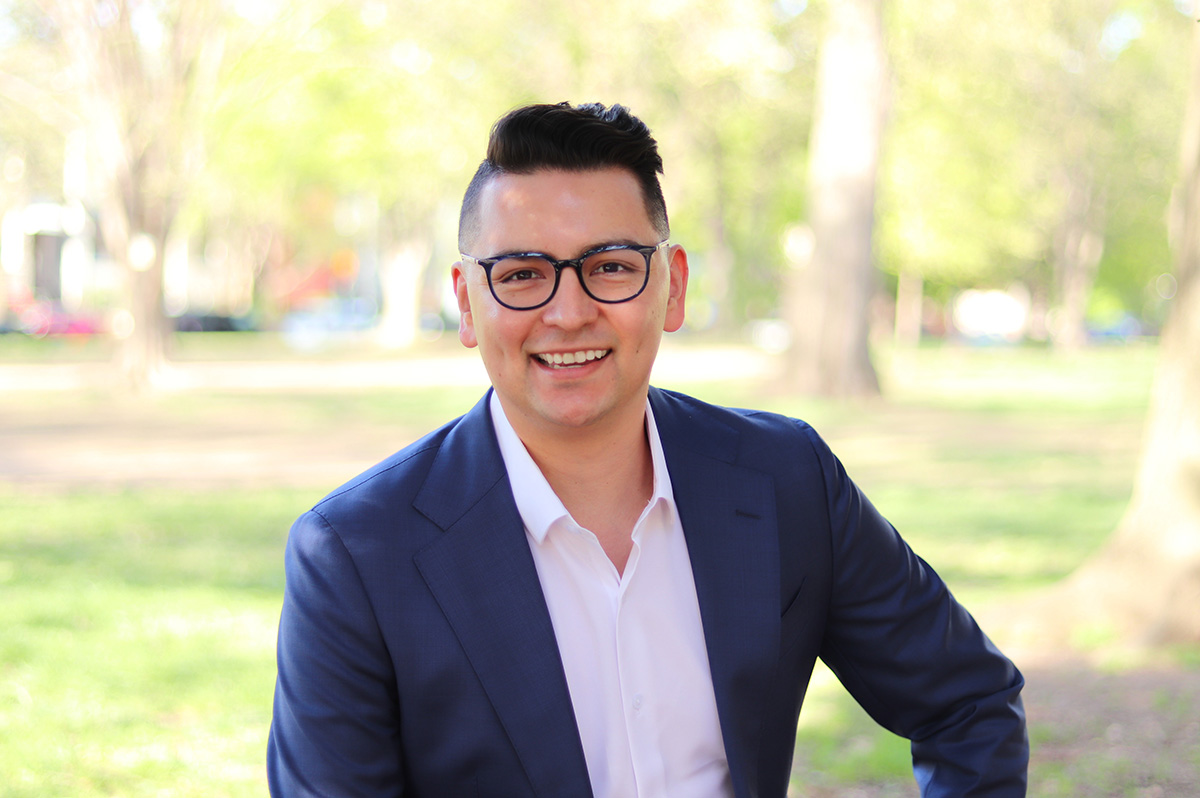News
State Dept. pledges to raise concerns over Nigeria anti-gay law
Says United States does ‘regret’ passage of restrictive legislation


The State Department says the United States does ‘regret’ passage of the anti-gay law in Nigeria. (Photo public domain)
State Department Deputy Spokesperson Marie Harf said on Monday the United States “will keep raising” concerns about Nigeria’s new anti-gay law, but maintained the relationship between the two countries will continue.
Under questioning from the Washington Blade, Harf said the State Department does “regret” the signing of the legislation by Nigerian President Goodluck Jonathan as she emphasized the country has a right to pass legislation through the democratic process.
“We just don’t support any legislation that institutionalizes discrimination against one select group of people, and I think one of the key reasons we are opposed to this is that the law goes far beyond prohibiting same-sex marriage,” Harf said. “It restricts freedom of assembly, association and expression for all Nigerians.”
As Secretary of State John Kerry noted in a statement earlier in the day, Harf said the law is “inconsistent” with the country’s international legal obligations and rights under its constitution.
“Obviously, we’ll keep raising these issues when they come up,” Harf said. “We’ve made our position on this very clear. It may make some work in the country harder to do, but we clearly have a relationship there that’s an important one, and we’ll continue working together.”
The law bans not only same-sex marriage and same-sex “amorous relationships,” but also membership in LGBT rights groups.
The Associated Press reports it’s now a crime in the country “to have a meeting of gays, or to operate or go to a gay club, society or organization.” Further, entering into a same-sex marriage contract or civil union is punishable by up to 14 years’ imprisonment.
During the briefing, Harf conceded that she didn’t immediately have a lot of information about the law, such as which international obligations it violates and whether the State Department had any prior knowledge Jonathan would sign the measure. Although she said she hasn’t heard any talk about possible sanctions against the country or a potential loss of aid as a result of the law, Harf said she’d have to double check.
But Harf was able to confirm that State Department officials were in contact with a variety of principals in Nigeria prior to the signing of the legislation.
“Since the law was in draft form, we’ve been in continual contact with the Jonathan administration, the National Assembly and a wide variety of Nigerian stakeholders,” Harf said. “Our conversations have been focused on our concerns that portions of the law, again, appear to restrict Nigerians’ rights to freedom of expression, assembly and association — provisions that we’ve been very clear we do not support.”
Harf wasn’t able to immediately identify who was representing the United States in those talks, including whether it was a senior diplomat or someone in a lower position.
According to the Associated Press, Nigeria is one of the top crude oil suppliers to the United States. A report from the U.S. Energy Information Administration indicates the U.S. oil imports from Nigeria are decreasing, but the United States imported 161,558 barrels of oil from the country in 2012.
News that the anti-gay legislation was signed in Nigeria is breaking after earlier reports a man in Cameroon died after being previously jailed for texting a same-sex partner and the Uganda parliament approved its own anti-gay legislation.
Harf said she wasn’t immediately able to say whether the State Department is concerned about an anti-gay trend in Africa, but maintained the Obama administration supports LGBT rights everywhere.
“We’ve talked about it elsewhere — whether it’s Russia, here or elsewhere — that we believe that LGBT rights are human rights, there’s no place for discrimination anywhere, such as this,” Harf said.
A partial transcript of the exchange between the Blade and State Department follows:
Washington Blade: Secretary Kerry issued a statement earlier today saying he’s “deeply concerned” about the passage of the anti-gay law in Nigeria, which contains punishments of up to 14 years in prison. Will passage of that law impact U.S.-Nigeria relations?
Marie Harf: Well, we did release a statement, and I would just note that we do regret that this bill, passed by Nigeria’s national assembly. was signed into law on Jan. 7.
Obviously, we respect the sovereignty of the Federal Republic of Nigeria and the prerogatives of its national assembly to pass legislation. We just don’t support any legislation that institutionalizes discrimination against one select group of people, and I think one of the key reasons we are opposed to this is that the law goes far beyond prohibiting same-sex marriage.
It restricts freedom of assembly, association and expression for all Nigerians. It’s inconsistent with Nigeria’s international legal obligations and undermines the democratic reforms and human rights protections enshrined in Nigeria’s constitution.
Obviously, we’ll keep raising these issues when they come up. We’ve made our position on this very clear. It may make some work in the country harder to do, but we clearly have a relationship there that’s an important one, and we’ll continue working together.
Blade: You just said it’s inconsistent with Nigeria’s international legal obligations. To which obligations are you referring?
Harf: I can check specifically with our attorneys and see what they intended with this part of the statement. Obviously, freedom of assembly, association and expression are topics we talk about a lot in terms of legal obligations, and also, anti-discrimination obligations as well. I can check if there’s more legal specifics to share.
Blade: Were there any conversations between State Department officials and Nigeria prior to the signing of this legislation?
Harf: There were. Let me what I have here. Since the law was in draft form, we’ve been in continual contact with the Jonathan administration, the National Assembly and a wide variety of Nigerian stakeholders. Our conversations have been focused on our concerns that portions of the law, again, appear to restrict Nigerians’ rights to freedom of expression, assembly and association — provisions that we’ve been very clear we do not support.
Blade: And who was representing the United States in those talks?
Harf: I can double-check and see who the specifics there are. I don’t have that in front of me.
Blade: The statement that the secretary put out was embargoed until an announcement from the Nigerian government. Did the State Department know this law was going to be signed beforehand?
Harf: I can check on that. Obviously, we’ve been discussions since it was in draft form and it passed. We were in discussions with the administration. I’m happy to check on that. Obviously, we allow governments to speak for themselves before we speak publicly about things as well.
Blade: Could sanctions or a loss of aid be on the table as a result of this law?
Harf: I haven’t heard talk of any of that. I’m happy to check with our folks. Again, we’ve made very clear what our position is on this, and I just don’t have a ton more on it. So, I know you probably have ten follow ups, but I’m happy to take them and see if I can answer them, but then we’ll move on.
Blade: Let me ask you one last question then. The news is breaking just after a man in Cameroon died after being sentenced for being gay and after Uganda passed its own anti-gay legislation — the parliament there. Is the State Department concerned about a larger trend in Africa about passage of anti-gay legislation?
Harf: I’m happy to check with our folks and see if there’s a trend that they’re concerned about. We speak very clearly for LGBT rights across the globe. We’ve talked about it elsewhere — whether it’s Russia, here or elsewhere — that we believe that LGBT rights are human rights, there’s no place for discrimination anywhere, such as this. So, we’re very clear whether it’s Africa or somewhere else that this is something we feel very, very strongly about. President Obama and the secretary have all made very clear statements to that regard. And I’m happy to check if there’s more details on this if you have more follow-ups.
India
Opposition from religious groups prompts Indian Pride group to cancel annual parade
Event was to have taken place in Amritsar on April 27

Pride Amritsar, a student-led organization in the Indian state of Punjab, earlier this month announced the cancellation of its Pride parade that was scheduled to take place on April 27, citing opposition from certain religious groups.
The event, planned for the Rose Garden in Amritsar, a city revered as a spiritual center of Sikhism, had faced mounting resistance from Sikh religious organizations, including the Nihang Singh faction and the Akal Takht, the faith’s highest temporal authority. These groups labeled the parade as “unnatural” and urged local authorities to deny permission, citing its potential to disrupt the city’s religious sanctity.
In an Instagram post on April 6, Pride Amritsar organizers Ridham Chadha and Ramit Seth elaborated on its mission and the reasons for the cancellation.
“Since 2019, we have organized peaceful parades and celebrations in Amritsar to connect and uplift the LGBTQIA+ community, with a particular focus on transgender individuals and their rights,” their statement read.
Chadha and Seth highlighted Pride Amritsar efforts in providing guidance, counseling, and job opportunities, which have been met with positive responses. However, due to opposition this year, Pride Amritsar announced the cancellation of the 2025 parade.
“We have no intention of harming the sentiments of any religious or political groups,” the statement read. “The safety of our members is our top priority, and we will take all necessary measures to ensure their protection.”
Chadha and Seth spoke with the Washington Blade about their decision to cancel the parade.
They explained that resistance came from both religious and political groups who labeled the parade and its values as anti-Sikh and contrary to Punjabi and Indian cultural norms. Critics specifically objected to the event’s location in Amritsar, a city regarded as a sacred center of Sikhism, arguing that the parade would disrupt its spiritual purity.
Chadha and Seth stressed Pride Amritsar lacks political, financial, or legal support. Composed of students and young professionals, the group organizes the parade biennially, dedicating personal time to advocate for the LGBTQ community.
“We do it independently, crowdfund the parade and cover the rest with our pockets,” said Seth and Chadha.
When asked by the Blade why Pride Amritsar did not approach the High Court or local authorities to protect the parade, despite the Supreme Court’s 2018 ruling that decriminalized consensual same-sex sexual relations, Chadha and Seth cited significant barriers.
“Pursuing legal action in India requires substantial resources, both financial and temporal,” they explained.
Chadha and Seth also noted that such action could lead to public shaming and unwanted publicity for participants, potentially harming their careers in Amritsar. They therefore chose not to pursue legal recourse.
Chadha and Seth said Pride Amritsar does not have any plans to hold alternative events.
“We are still exploring options, but we are likely not holding any events this year,” they said, citing significant harassment that organizers faced and the need for time to plan how to best serve the local LGBTQ community moving forward.
“Our evaluation of what the biggest challenge is has changed after this year,” said Chadha and Seth to the Washington Blade. “The biggest challenge, by far, seems to be education. We need to educate the community about what the community is, does, and why it exists. Why we do parades. Why we dance. Why calling someone ‘chakka’ is harmful. How we actually fit into religion and fall within the guidelines.”
Chadha and Seth said organizing the parade in Amritsar since 2019 has been an uplifting experience, despite continued opposition.
“The moment you join the parade, chant a slogan, or sing a song, it’s transformative,” they said. “Fear vanishes, and a sense of freedom takes over.”
The cancellation of the 2025 Amritsar Pride Parade has sparked concerns among activists in Punjab, as the Indian Express reported.
The Punjab LGBT Alliance and other groups expressed concern that the decision to cancel the parade may strengthen opposition to future LGBTQ-specific events.
District of Columbia
D.C. police seek help in identifying suspect in anti-gay threats case
Victim threatened with assault, called ‘faggot’ as he left Capitals game

D.C. police are seeking help from the public in identifying a male suspect whose image was captured by a video surveillance camera after he allegedly shouted anti-gay slurs and threatened to assault a man at 6th and H Streets, N.W. on March 20 at about 9:54 p.m.
A police report says the victim told police the incident took place shortly after he exited the nearby Capital One Arena where he had attended a Washington Capitals hockey game.
The police report says the incident began when the victim saw the suspect yell a racist slur at a person behind the victim and started to berate a valet operator.
“Suspect 1 then turned his attention to Victim 1 and called him a ‘faggot’ among other homophobic slurs,” the report says. It says the victim then used his phone to record the suspect, prompting the suspect to walk away before returning and “snatching” the phone from the victim’s hand.
“Suspect 1 walked several feet as Victim 1 followed, requesting his phone back,” the report continues. “Suspect 1 stopped and turned to Victim 1 and while yelling other obscenities exclaimed ‘if you keep recording, I’m going to kick your ass.’” The report concludes by saying the victim was able to recover his phone.
It lists the incident as a “Threats To Do Bodily Harm” offense that is a suspected hate crime.
“Anyone who can identify this suspect or has knowledge of this incident should take no action but call police at 202-727-9099, or text your tip to the Department’s TEXT TIP LINE at 50411,” according to a separate police statement released April 23.
The statement says police currently offer an award of up to $1,000 to anyone who can provide information that leads to an arrest and indictment of the person or persons responsible for a crime committed in D.C.
D.C. police spokesperson Tom Lynch said the case has been under investigation since the incident occurred on March 20. He said the video image of the suspect, most likely obtained from a security camera from a nearby business, was released to the public as soon as it was obtained and processed through the investigation.
District of Columbia
Wanda Alston Foundation names new executive director
Longtime LGBTQ rights advocate Cesar Toledo to succeed June Crenshaw

The Wanda Alston Foundation, the D.C.-based organization that has provided housing and support services for homeless LGBTQ youth since its founding in 2008, announced it has appointed longtime LGBTQ rights advocate Cesar Toledo as its new executive director.
In an April 22 statement, the organization said that as part of a planned leadership transition launched in November 2024, Toledo will succeed June Crenshaw, who Alston Foundation officials and LGBTQ community activists say has led the organization with distinction in her role as executive director for the past nine years.
In a statement released last November, the foundation announced Crenshaw was stepping down from her role as executive director after deciding to “to step into her next chapter.”
“June’s leadership has been truly transformative,” said Alston Foundation Board Chair Darrin Glymph in the group’s April 22 statement. “We are immensely grateful for her dedication and equally excited for the energy and experience that Cesar brings to lead us into this next chapter,” Glymph said.
“A seasoned LGBTQ+ advocate, Cesar brings over a decade of experience leading national campaigns, shaping public policy, and building inclusive communities,” the statement released by the group says. “Most recently, he served as the National LGBTQ+ Engagement Director for the Harris for President Campaign and has built a career focused on advancing equality and equitable education,” it says.
Biographical information about Toledo shows that immediately prior to working for the Harris For President Campaign, he served since April 2023 as deputy director for Democrats for Education Reform DC (DFER DC), a political group that helps to elect candidates for public office committed to quality education for all students, including minorities, people of color and LGBTQ youth.
Before joining DFER DC, Toledo served as political director for the LGBTQ+ Victory Fund, where he assisted in electing out LGBTQ candidates to all levels of public office across the U.S.
“I’m really excited about joining the Wanda Alston Foundation,” Toledo told the Washington Blade. “After a decade of working at the intersection of politics and policy and advancing political candidates and equitable education here in D.C., I wanted to shift my career to direct services to the most vulnerable folks in the LGBTQ+ family and our homeless youth,” he said.
Among other things, he said he would push for increasing the Alston Foundation’s visibility and mainlining its services for LGBTQ youth at a time when the national political climate has become less supportive.
A statement on its website says the Alston Foundation was founded in 2008 “in memory of Wanda Alston, a fierce LGBTQ+ activist, national advocate, and government official who was admired by District residents.”
The statement adds, “The foundation opened the first housing program in the nation’s capital in 2008 providing pre-independent transitional living and life-saving support services to LGBTQ+ youth.”
In a separate statement, the Alston Foundation announced it would hold a “thank you” celebration of appreciation for June Crenshaw from 6-8 p.m. on May 20 at Crush Dance Bar located at 2007 14th Street, N.W. in D.C.
“Let’s come together to celebrate her dedication and commitment for everything she has done for the LGBTQIA homeless youth population,” the statement says.




















